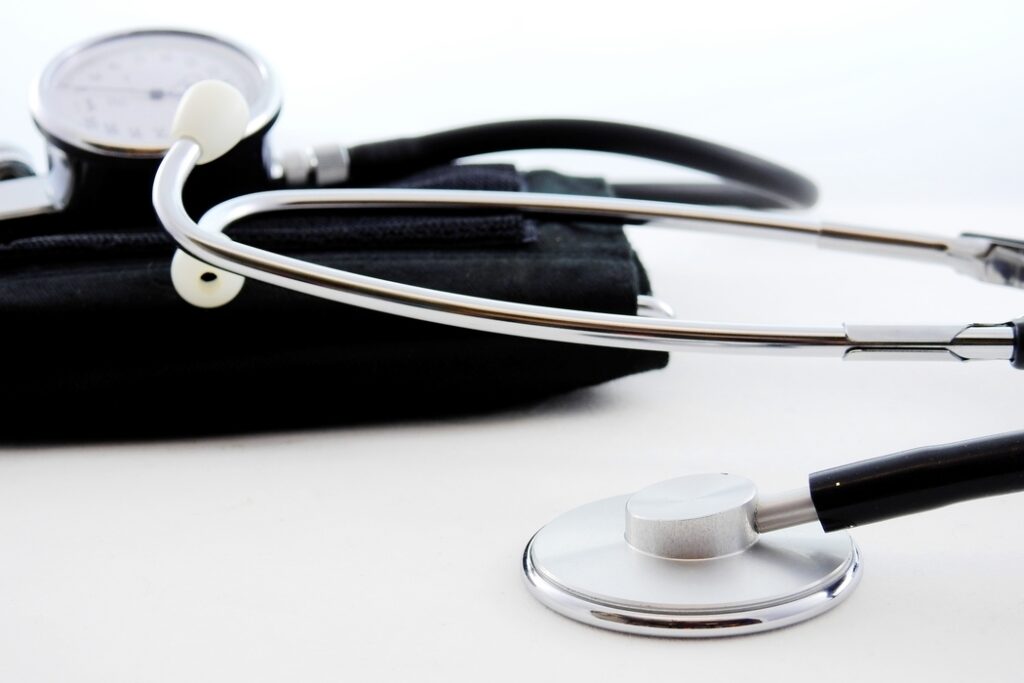You may have heard the saying “an apple a day keeps the doctor away,” but for some, a visit to the doctor – even for routine visits – is a cause for stress and anxiety.
If that describes you, you may have noticed that your blood pressure (BP) is high during medical appointments, even though it’s usually within normal ranges at home. There’s a term for this: Whitecoat Hypertension (WCH).
And as it turns out, about 20% of adults suffer from WCH, also referred to as White Coat Syndrome or the White Coat Effect.

What is White Coat Hypertension?
As you may have already guessed, WCH is when your blood pressure readings are abnormally elevated when in a medical environment, such as the doctor’s office or urgent care center.
It is called “white coat” hypertension because healthcare professionals are known for wearing white coats, and the anxiety and stress you experience during medical visits can trigger your body to release hormones that raise your BP, like adrenaline.
Why Does White Coat Hypertension Matter?
You might think that WCH shouldn’t matter too much because it’s a temporary condition.
However, the downside of WCH is that your doctor may think your blood pressure is always high just because it is high when your measurements were taken. This means you may be prescribed unnecessary medications, which may lead to other complications, like your blood pressure becoming too low (hypotension).
Also, if you have WCH, you are more likely to have elevated BP in other stressful situations as well, like business meetings, bad traffic, or various life events. These stress-related spikes may require specific treatment to ward off dangerous cardiovascular risks.

How Do I Know if I Have WCH or Regular Hypertension?
Good question! If you’re diagnosed with Hypertension (high blood pressure), you should ask your doctor if you might have WCH. In fact, according to one study, “nearly 93% of adults in the United States who have high blood pressure… should be screened for ‘white coat hypertension’.” Your doctor may recommend confirming the diagnosis by one of two methods: home monitoring or ambulatory blood pressure monitoring.
- Home blood pressure monitoring is easy with an automated blood pressure monitor that you can use yourself in the comfort of your home. Make sure to look for a clinically validated blood pressure monitor to ensure accuracy. Watch this short video tutorial for more information.
Your doctor will likely recommend that you take your blood pressure at the same time each day and record it in a logbook. You may also be asked to record how you feel, what you’ve eaten or had to drink, and your activity level because these things can all impact your readings.
- Ambulatory blood pressure monitoring (ABPM), also known as 24-hour blood pressure monitoring, is when you wear a blood pressure monitor for at least one full day. The monitor will take your BP at intervals set by your provider, including when you sleep. This will give your doctor an idea of how your blood pressure fluctuates throughout the day, including during different activities. To learn more about how doctors use ABPMs to diagnose different types of Hypertension, read our ABPM whitepaper.
How Do You Treat White Coat Hypertension?
For people who experience WCH, it may be easier to say than to do, but try to relax. Here are some tips:

Take a breath
Focus on calm, even breaths, learn some breathing exercises, or try practicing meditation in the waiting room.

Change the scenery
If waiting in a crowded waiting room is stressing you out, ask the receptionist if there’s a quiet place you can wait, like an unused exam room or a meeting space.

Think happy thoughts
Take a few moments to focus on something that makes you smile – your goofy dog, a recent vacation, the last holiday with your family – maybe even flip through some photos on your phone.

Bring a friend
Having someone to talk to – even if it’s just to chat while you wait for your appointment – can help calm your nerves and settle your fears.
As always, if you’re worried about WCH or your diagnosis of Hypertension, bring your concerns up with your doctor. Ruling out (or confirming) WCH is a simple process that can give you added peace of mind, no matter your final diagnosis.

